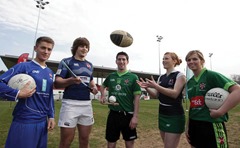Everyone can build a shared future
 Tackling sectarianism is a responsibility that was taken on by One Small Step in 2005. Trevor Ringland talks to Peter Cheney about its continued relevance and how society can make progress outside the political arena.
Tackling sectarianism is a responsibility that was taken on by One Small Step in 2005. Trevor Ringland talks to Peter Cheney about its continued relevance and how society can make progress outside the political arena.
“Every society needs to work at how it builds relationships,” Trevor Ringland reflects, “but we need to work at it harder because of the conflict that we went through.”
Nine years ago, Ringland was heading up the One Small Step campaign to challenge sectarian attitudes and encourage everyone in Northern Ireland to do one thing to help them understand or reach out to the other side of the community. Its thrust was that everyone can do something to improve cross-community relations even when political leadership is lacking.
A Presbyterian and unionist, Ringland has a strong Irish identity, partly from his rugby career. He co-chaired the campaign with Arts Council Chief Executive Roisin McDonough.
The flags and parading disputes show that this work still matters. Sectarian attitudes are present throughout society although they are most visible when unrest breaks out. “When I see young people taking part in deeply sectarian events, then that worries me about what we are doing,” Ringland says. “Are we just storing up problems for the future?”
One Small Step was launched in 2005 in the midst of a “political flux”. Its members’ views differed but they were “all genuinely committed to sharing this place in a constructive way.” Three broad themes were agreed:
• everybody can do something;
• challenge our leaders and their behaviour; and
• focus on things that have worked in the past and roll those out.
Ringland saw this as a continuation of similar work that had been going on since the 1960s. Community relations work has been dismissed as irrelevant by cynics but he explains that getting this right is essential for getting Northern Ireland as a whole to work properly. Its message to those encouraging division was: “If you continue to do that, then how can you end up with a peaceful and stable and increasingly strong society?”
The campaign’s success was hard to measure but he can point to 24 of the 26 councils signing up over the year of the project, support from various schools and community groups, and the publication of a booklet – ‘100 Small Steps’ – which highlighted positive work taking place.
“I think it was needed then and is still needed now,” Ringland says of this approach. Unlike in South Africa, for example, Northern Ireland’s residents have to “live among each other”. This means rebuilding trust and rediscovering relationships that had gone wrong at some point in the past. The Queen’s visit to the Republic was a “classic example” of rediscovery.
Neither the union nor Irish unity can be guaranteed but he wants to see Northern Ireland having a “united people” regardless of its status.
Continuing to practice “the politics of fear, victimhood and alienation” will only result in a “cold peace”. If people settle for that, he adds: “We are never really going to maximise the potential that exists in this place. It’s a beautiful part of the world and the people are great – if you press the right buttons.”
Ringland contends that if politicians lack the skills to deliver on this, they should allow those who do to get on with solutions e.g. encouraging meaningful shared schooling from a young age.
After One Small Step, its organisers “stood back because we wanted the politicians to take it on” but this “hasn’t happened to the extent that it should have.”
Ringland acknowledges that political leaders have brought about stability but they are “not getting to grips” with division, sectarianism and racism. Designated days for all councils, in his view, would be the best solution “if you really wanted to take the flag out of politics.”
That said, he is encouraged by progress elsewhere in society. Rugby, football and Gaelic games are now working more closely together and the RUC has successfully been reformed into the PSNI.
 We discuss what small steps are particularly relevant in 2014 and he sets out a possible way ahead, starting at the grassroots. Every town or village, Ringland comments, should have a ‘one small step committee’ or a similar body by another name with members from civic society. Working with local politicians, it would then ask: “How do we share our town or village better and how do we share the area that we live in better with surrounding towns and villages?”
We discuss what small steps are particularly relevant in 2014 and he sets out a possible way ahead, starting at the grassroots. Every town or village, Ringland comments, should have a ‘one small step committee’ or a similar body by another name with members from civic society. Working with local politicians, it would then ask: “How do we share our town or village better and how do we share the area that we live in better with surrounding towns and villages?”
This step would be inexpensive but could have a considerable impact. Northern Ireland, he concludes, has been shown “grace” and still has an opportunity to make sure that the events of its troubled past “never happen again.”
Small steps for individuals
• Read a newspaper from ‘the other side’ for a day or week
• Listen to an Irish language programme or pipe band programme
• Learn some Irish or Ulster-Scots
• Buy a book by an Irish or British poet and read it
• Watch a Gaelic game on TV
• Watch a cricket match
• Search for information on the Hibernians or loyal orders
• Find out what certain symbols and religious icons mean
Small steps in the community
• Encourage organisations to which you belong to organise events with people they normally avoid or don’t know
• Discuss your own beliefs and experiences with someone with whom you normally don’t talk to about these things
• Talk to a member of the orders from your own tradition to see if you can understand what they are and what they believe
• Organise a night of cultural activities
• Organise a mixed five-a-side football match





